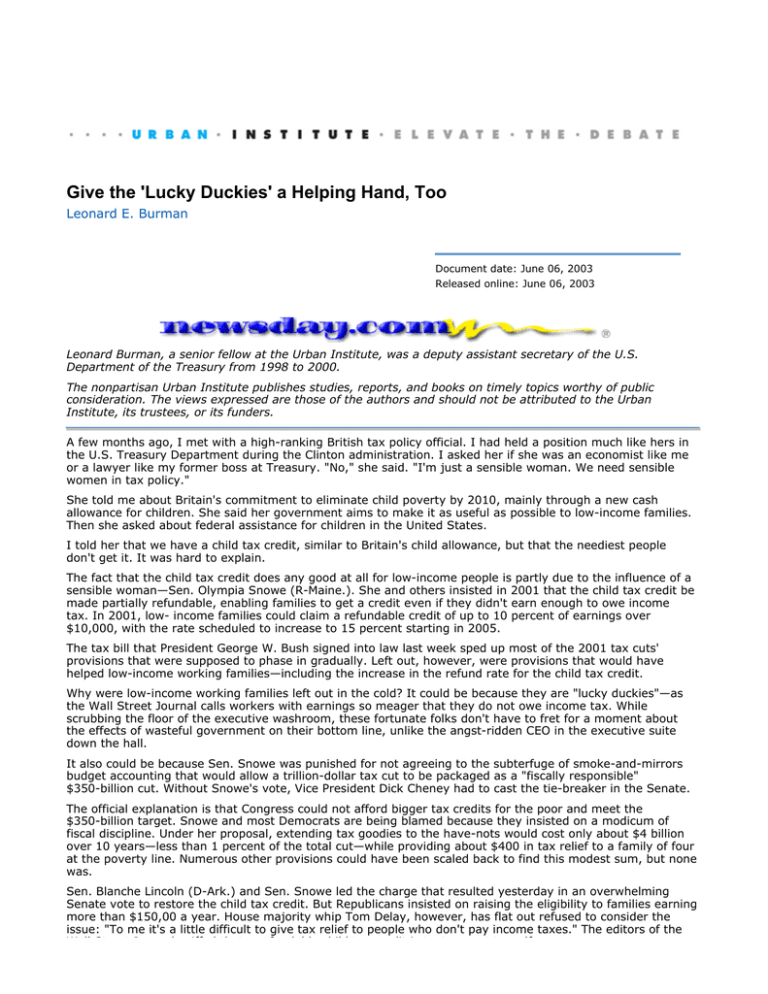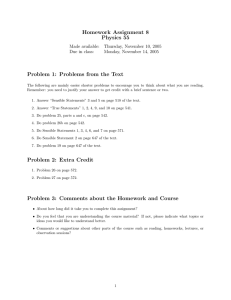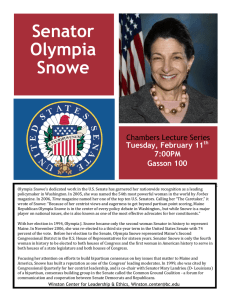Give the 'Lucky Duckies' a Helping Hand, Too Leonard E. Burman
advertisement

Give the 'Lucky Duckies' a Helping Hand, Too Leonard E. Burman Document date: June 06, 2003 Released online: June 06, 2003 Leonard Burman, a senior fellow at the Urban Institute, was a deputy assistant secretary of the U.S. Department of the Treasury from 1998 to 2000. The nonpartisan Urban Institute publishes studies, reports, and books on timely topics worthy of public consideration. The views expressed are those of the authors and should not be attributed to the Urban Institute, its trustees, or its funders. A few months ago, I met with a high-ranking British tax policy official. I had held a position much like hers in the U.S. Treasury Department during the Clinton administration. I asked her if she was an economist like me or a lawyer like my former boss at Treasury. "No," she said. "I'm just a sensible woman. We need sensible women in tax policy." She told me about Britain's commitment to eliminate child poverty by 2010, mainly through a new cash allowance for children. She said her government aims to make it as useful as possible to low-income families. Then she asked about federal assistance for children in the United States. I told her that we have a child tax credit, similar to Britain's child allowance, but that the neediest people don't get it. It was hard to explain. The fact that the child tax credit does any good at all for low-income people is partly due to the influence of a sensible woman—Sen. Olympia Snowe (R-Maine.). She and others insisted in 2001 that the child tax credit be made partially refundable, enabling families to get a credit even if they didn't earn enough to owe income tax. In 2001, low- income families could claim a refundable credit of up to 10 percent of earnings over $10,000, with the rate scheduled to increase to 15 percent starting in 2005. The tax bill that President George W. Bush signed into law last week sped up most of the 2001 tax cuts' provisions that were supposed to phase in gradually. Left out, however, were provisions that would have helped low-income working families—including the increase in the refund rate for the child tax credit. Why were low-income working families left out in the cold? It could be because they are "lucky duckies"—as the Wall Street Journal calls workers with earnings so meager that they do not owe income tax. While scrubbing the floor of the executive washroom, these fortunate folks don't have to fret for a moment about the effects of wasteful government on their bottom line, unlike the angst-ridden CEO in the executive suite down the hall. It also could be because Sen. Snowe was punished for not agreeing to the subterfuge of smoke-and-mirrors budget accounting that would allow a trillion-dollar tax cut to be packaged as a "fiscally responsible" $350-billion cut. Without Snowe's vote, Vice President Dick Cheney had to cast the tie-breaker in the Senate. The official explanation is that Congress could not afford bigger tax credits for the poor and meet the $350-billion target. Snowe and most Democrats are being blamed because they insisted on a modicum of fiscal discipline. Under her proposal, extending tax goodies to the have-nots would cost only about $4 billion over 10 years—less than 1 percent of the total cut—while providing about $400 in tax relief to a family of four at the poverty line. Numerous other provisions could have been scaled back to find this modest sum, but none was. Sen. Blanche Lincoln (D-Ark.) and Sen. Snowe led the charge that resulted yesterday in an overwhelming Senate vote to restore the child tax credit. But Republicans insisted on raising the eligibility to families earning more than $150,00 a year. House majority whip Tom Delay, however, has flat out refused to consider the issue: "To me it's a little difficult to give tax relief to people who don't pay income taxes." The editors of the Wall Street Journal sniffed that a refundable child tax credit is tantamount to welfare. Wall Street Journal sniffed that a refundable child tax credit is tantamount to welfare. Actually, the child tax credit—and a host of other tax subsidies—are a form of welfare, whether or not they are refundable. These subsidies are in the tax code because advocates of working families discovered that tax credits were far easier to enact than direct cash-assistance programs. A spending program would be critiqued as "tax and spend," whereas a similar program implemented through a tax credit looks like a tax cut so it gets a warmer reception from conservatives. The only problem with this "ducky" political compromise is that a cash assistance program—such as a child subsidy—that leaves out those most in need makes no sense. The bottom line: $90,000 in tax cuts for the average millionaire and nothing for the working poor. It would be hard to explain this package to my British colleague. After all, she's a sensible woman. Other Publications by the Authors Leonard E. Burman Usage and reprints: Most publications may be downloaded free of charge from the web site and may be used and copies made for research, academic, policy or other non-commercial purposes. Proper attribution is required. Posting UI research papers on other websites is permitted subject to prior approval from the Urban Institute—contact publicaffairs@urban.org. If you are unable to access or print the PDF document please contact us or call the Publications Office at (202) 261-5687. Disclaimer: The nonpartisan Urban Institute publishes studies, reports, and books on timely topics worthy of public consideration. The views expressed are those of the authors and should not be attributed to the Urban Institute, its trustees, or its funders. Copyright of the written materials contained within the Urban Institute website is owned or controlled by the Urban Institute. Source: The Urban Institute, © 2012 | http://www.urban.org


